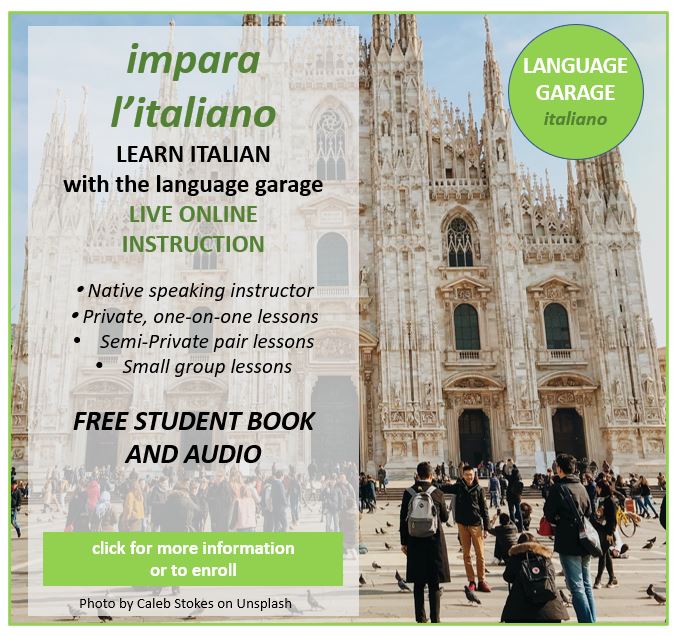Italian Family Terms: La Famiglia
In this post, we’ll learn Italian family terms so that you can build your Italian vocabulary to talk about your famiglia family.
Ciao! This post is a free sample of a lesson from our online Italian course. The beginner’s course includes all of the vocabulary from our basic mini-lessons, with full audio support by native speakers. The online course also includes simple explanations of basic Italian grammar, plenty of examples, and loads of practice exercises, quizzes, and games. You can check out sample lessons or enroll in the online course here.
Hai una famiglia numerosa? Do you have a big family?
First, let’s build your Italian vocabulary by starting with some basic Italian family terms:: la madre mother; il padre father; il fratello brother; la sorella sister; la figlia daughter; il figlio son, i genitori parents; i bambini children.
- Ho una famiglia grande (numerosa)/ piccola.
I have a big/small family. - Mia madre è un medico. Mio padre è un insegnante.
My mother is a doctor. My father is a teacher.
- Hai fratelli o sorelle?
Do you have brothers or sisters? - Ho una sorella maggiore e un fratello minore.
I have one older sister and one younger brother. - Ho tre fratelli.
I have three brothers. - Ho due sorelle.
I have two sisters. - Sono figlio unico/figlia unica.
I am an only child. - Hai dei bambini?
Do you have any children? - Abbiamo un figlio e una figlia.
We have a son and a daughter. - Chi è il più grande (vecchio)/ il più piccolo (giovane) della tua famiglia?
Who is the oldest/youngest in your family?
Questa è mia zia. This is my aunt.
Now let’s build your Italian vocabulary by looking at some extended Italian family terms: i parenti relatives; i nonni grandparents; la nonna grandmother; il nonno grandfather; il nipote (nipotino) grandson; la nipote (nipotina) granddaughter; una zia aunt; lo zio uncle; il cugino/ la cugina cousin; la nipote niece; il nipote nephew.
- Quanto spesso vedi i tuoi parenti?
How often do you see your relatives? - Dove abitano i tuoi nonni?
Where do you grandparents live? - Mia nonna lavora ancora, ma mio nonno è in pensione.
My grandmother is still working, but my grandfather is retired. - Abbiamo tre nipoti: un nipote e due nipoti.
We have three grandchildren: one grandson and two granddaughters. - Mia zia e mio zio abitano vicino a casa nostra.
My aunt and uncle live near our house. - Ho molti cugini.
I have a lot of cousins. - Mia nipote ha appena iniziato l’università.
My niece just started university. - Ho quattro nipoti.
I have four nephews.
Italian Vocabulary Related to Marriage
Now let’s learn some Italian vocabulary related to marriage. Some key vocabulary to know is: la moglie wife; il marito husband; il fidanzato/la fidanzata fiancé(e); sposarsi to get married; divorziare to get divorced; nubile (signorina)/celibe (scapolo) single (f./m.). Let’s see some examples.
- Sei sposato o scapolo (celibe)? (m.)
Sei sposata o nubile (signorina)? (f.)
Are you married or single? - Che lavoro fa tua moglie/ tuo marito?
What does your wife/husband do for a living? - Quando ti sei sposato/a?
When did you get married? - Siamo sposati da vent’anni. Il nostro anniversario di matrimonio è questo fine settimana.
We’ve been married for twenty years. Our wedding anniversary is this weekend. - Mia moglie è incinta. Avremo un bambino/ una bambina tra due mesi.
My wife is pregnant. We’re having a baby in two months. - I miei genitori sono divorziati.
My parents are divorced.
Abbiamo un bambino. We have a baby.
Finally, let’s learn some Italian vocabulary to talk about things related to families: il (mio/tuo/etc.) ragazzo boyfriend; la (mia/tua/etc.) ragazza girlfriend; il bambino/ la bambina baby; incinta pregnant; adottare to adopt; nascere to be born; morto dead; vivo alive; il patrigno stepfather; la matrigna stepmother; il figliastro stepson; la figliastra stepdaughter.
- Come si chiama il tuo ragazzo/la tua ragazza?
What is your boyfriend’s/girlfriend’s name? - Adottiamo un bambino/ una bambina.
We’re going to adopt a child. - Sono stato adottato/ statta adottata.
I was adopted. - Quando è nato tuo figlio/nata tua figlia?
When was your son/daughter born? - Mia nonna è viva, ma mio nonno è morto.
My grandmother is alive, but my grandfather is dead. - Ho un buon rapporto con il mio patrigno/ la mia matrigna.
I have a good relationship with my stepfather/stepmother. - La mia figliastra/ Il mio figliastro vive con noi.
My stepdaughter/stepson lives with us. - La mia famiglia ha un cane e un gatto.
My family has a dog and a cat.
Do you want to learn Italian?
We hope you’ve enjoyed expanding your Italian vocabulary by learning some key Italian family terms. If you want to learn more, check out our other posts on Italian language, culture, and more. And if you’re looking for convenient and affordable live Italian lessons with a real teacher, check out The Language Garage. Our lessons are given online in a virtual classroom, so it doesn’t matter where you live or work – we can come to you. And we have flexible options, with a free trial so that you can decide if there’s a fit. Check us out!
Image: marvel68 on Pixabay







